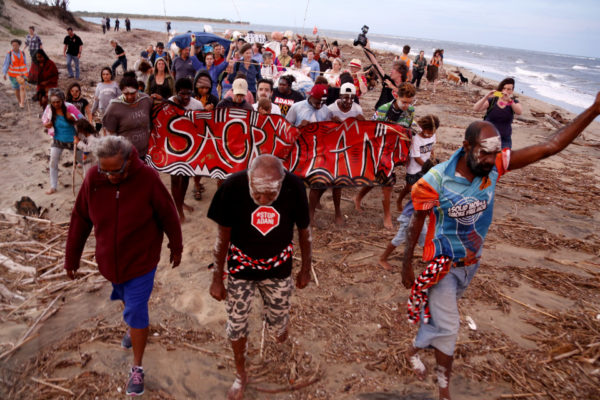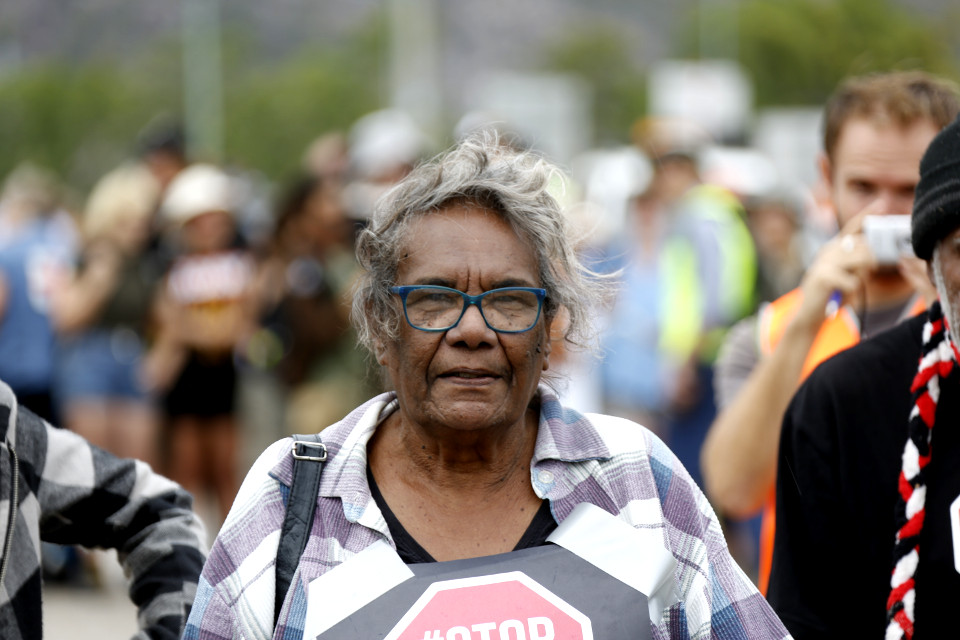In Australia, a new mining megaproject threatens to devastate the Great Barrier Reef and the land of First Nations peoples. The planned Carmichael mine, set to be one of the world’s largest, will be located in the northeastern state of Queensland, within the vast Galilee Basin. It will be owned and operated by the Indian conglomerate Adani, which plans to export most of the coal to India by sea, via a soon-to-be-expanded port that sits on the Great Barrier Reef.
There is widespread opposition to the Adani project across Australia, which is already the world’s largest exporter of coal. So far, the outcry has discouraged the country’s four biggest banks from funding the project, and local activists have sought international support to keep the pressure on Adani.
Carol Prior is a key activist in the anti-Carmichael movement. She is an elder of the Juru people, an Australian First Nations community on whose traditional lands the mine’s railway line and coal terminal will be built. The passage of Australia’s 1993 Native Title Act granted First Nations peoples some limited rights over their traditional lands and forced mining companies like Adani to negotiate with them, but those rights, Prior and other activists say, are meager at best—and in recent years the Australian government has further curbed them. In 2017, the federal government amended the law to overturn a Federal Court ruling so that fewer representatives of First Nations communities have to approve deals with corporations for them to move forward. In the case of the Carmichael mine, Adani has already reached an agreement to operate on Juru lands, even though many members of the community remain staunchly opposed to the project.
We spoke to Prior about her experiences as a First Nations activist, her passion for protecting what her people refer to as “Juru country,” and her warning to the world about the environmental and cultural costs of valuing electricity over life.
Can you tell us about yourself?
I’m 71 years old. My grandparents met and married in Bowen, Queensland, in about 1901. From there they were removed to an Aboriginal mission called Hull River Mission [at Mission Beach, now a popular tourist destination]. Everyone who’d been taken away from their lands was put in the mission—it was set up for this. They were moved again, this time to Palm Island, because a cyclone blew the Hull River Mission away.
First Nations people were under the Aboriginal Protection Act right up until 1976. The Act meant that no one could move [from where they were placed] unless they had a permit. If you got a permit, it would state that you could only move around for one or two days. My father got an exemption to go and work in Ingham, and I was born there.
My fight really began in the early 1990s, with the Native Title claim for Juru country. We were only allowed back on Juru country to visit our sacred places and cultural heritage sites in 1995. But by then it was all private property and locked gates.
Did the Native Title Act mean that you could reclaim your land?
No. When they brought in the Native Title Act, it was another act to keep us chained to slavery. We’ve still got nothing. It’s just token. For example, we won the Native Title claim for Cape Upstart. But it had been made into a national park, and you needed permission from the Queensland Parks and Wildlife [Service] to do anything.
You were originally on the negotiating team with Adani. What happened?
When we received our Native Title, the judge ordered that a [legal body] be set up to represent the Juru people. The board of directors, of which there are eight, have refused to accept the membership of people who really have Juru heritage. This is because it’s people like me, who have Juru heritage, who will fight for our land. You’ve got anthropologists, lawyers, and the state government, who will put people on the [legal bodies] to make sure that things like the Adani project are signed off. To me, it’s divide and conquer.
I was elected to be a spokesperson for my family, but the other seven family representatives voted me off. The reason I got voted off was because I asked, “How many jobs are going to be provided for the [Juru] people?” Apparently, more than 4,000 jobs, including traineeships. That sounded good to me. But then we were told that the hiring would be done by subcontractors. I said, “I don’t like that.” Subcontractors have their own workers. They won’t want to give jobs to us. When subcontractors come in, whatever deal we have made with Adani isn’t worth the paper it’s written on.

Do you think the struggle against Adani is also a struggle in solidarity with First Nations people?
Yes. [Adani founder and chairman] Gautam Adani is planning to destroy a tribe of people he knows nothing about. Adani and the Indian people will watch us get wiped out to give them electricity. When I say this, I mean that they’re taking away our very existence, taking away our spiritual connection to our sacred sites and our whole land. I’m damned if I’ll ever stand for that.
The planned railway line is only 30 meters from our rock art at Mount Roundback. The trains will go past, and the coal dust will cover the rock art. It will also go through our ochre ground, which was used to paint those 3,000-year-old paintings, and for our corroborees. Once that railway line is in position, the land will become private, and we won’t be able to cross it to visit our rock art. Our rock art is there for us to learn about our ancestors. It tells us, “This is where you come from, and this is where your spiritual connection is. This is your country.” We are at one with everything around us. We come from Mother Earth. When we die, we know we’re going back to Mother Earth. The Adani project will destroy our sacred sites and everything that is spiritual to us.
How will the Adani project affect the Great Barrier Reef?
Everything in the ocean has a meaning to Juru people. We are saltwater people, and we have a connection to the ocean. I’ve seen coal dust on the beach. When the turtles lay their eggs, the coal dust heats the eggs, and they don’t hatch. You can see the dust on the top of the ocean. The coral reef has so many animals, and the Caley Valley wetlands, which will be affected, are a breeding ground for coral crabs. Black swans also nest there, and it’s a breeding place for fish. Adani is building its [coal port] extension not far from the wetlands. Of course, whatever happens on the land will go out into the ocean. If it kills on land, it will kill in the ocean. It’s a domino effect.
Do you think that people around the world can act in solidarity with the struggle against Adani?
Yes, we need the world to stand up. There is nothing more beautiful, richer, or rarer than the Barrier Reef. If we allow it to be destroyed, all of the creatures will become extinct. The only place people will see them is in a book. People will be saying, “Why didn’t our grandparents stand up to protect them? They should have fought to protect them.” Put your hands up, be counted, help us to protect this place. The reef is not just for Australians—it’s for the world. The animals you find in Australia, you won’t find anywhere else. If we destroy their habitats, we have nothing.
This interview has been condensed and edited.
Eliza Egret and Tom Anderson are part of Shoal Collective, a newly formed cooperative of writers and researchers writing for social justice and a world beyond capitalism. Twitter: @shoalcollective
- Follow us on Twitter: @inthefray
- Comment on stories or like us on Facebook
- Subscribe to our free email newsletter
- Send us your writing, photography, or artwork
- Republish our Creative Commons-licensed content

